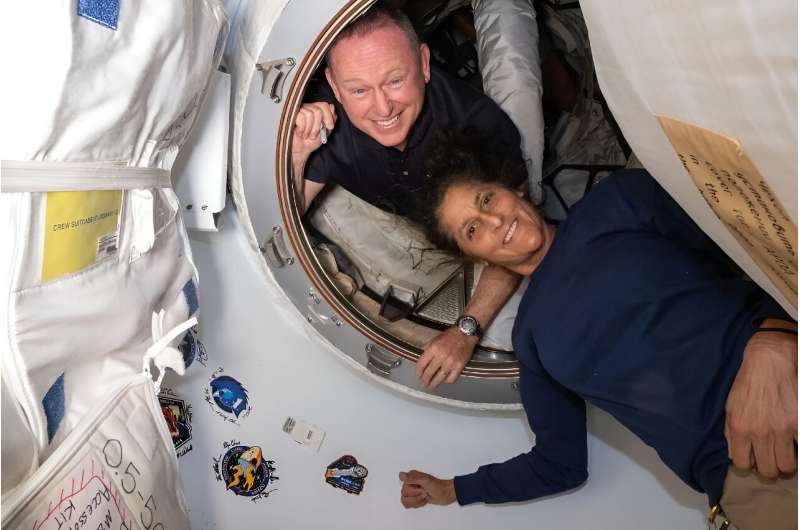NASA near-Earth defense telescope retired after more than a decade
Saturday, 10 August 2024 23:26 After more than a decade of tracking asteroids and comets that could pose a threat to Earth, NASA's Near-Earth Object Wide-field Infrared Survey Explorer is now officially shut down.
The space agency sent the final command to the NEOWISE craft Thursday from its Jet Propulsion Laboratory (JPL) in Southern California, ending its so-called planetary defense mission after more than 10 years
After more than a decade of tracking asteroids and comets that could pose a threat to Earth, NASA's Near-Earth Object Wide-field Infrared Survey Explorer is now officially shut down.
The space agency sent the final command to the NEOWISE craft Thursday from its Jet Propulsion Laboratory (JPL) in Southern California, ending its so-called planetary defense mission after more than 10 years NASA Invites Proposals for Utilizing VIPER Moon Rover
Saturday, 10 August 2024 23:26 As part of its commitment to advancing lunar exploration, NASA has issued a Request for Information (RFI) to identify potential interest from American companies and institutions in deploying the VIPER Moon rover for a mission.
The Volatiles Investigating Polar Exploration Rover (VIPER) was developed to identify and map resources, such as lunar ice, at the Moon's South Pole. Despite NASA's
As part of its commitment to advancing lunar exploration, NASA has issued a Request for Information (RFI) to identify potential interest from American companies and institutions in deploying the VIPER Moon rover for a mission.
The Volatiles Investigating Polar Exploration Rover (VIPER) was developed to identify and map resources, such as lunar ice, at the Moon's South Pole. Despite NASA's A 'FURST' of its Kind: Sounding Rocket Mission to Study Sun as a Star
Saturday, 10 August 2024 23:26 From Earth, one might be tempted to view the Sun as a unique celestial object like no other, as it's the star our home planet orbits and the one our planet relies on most for heat and light. But if you took a step back and compared the Sun to the other stars NASA has studied over the years, how would it compare? Would it still be so unique?
The Full-sun Ultraviolet Rocket SpecTrograph (FUR
From Earth, one might be tempted to view the Sun as a unique celestial object like no other, as it's the star our home planet orbits and the one our planet relies on most for heat and light. But if you took a step back and compared the Sun to the other stars NASA has studied over the years, how would it compare? Would it still be so unique?
The Full-sun Ultraviolet Rocket SpecTrograph (FUR US, Australia collaborate to enhance GPS resilience in contested environments
Saturday, 10 August 2024 23:26 Members of the Australian Department of Defence recently joined forces with the Joint Navigation Warfare Center to put GPS devices to the test. The goal was to assess their performance under simulated jamming conditions and enhance their resilience in contested environments.
The combined effort brought together experts from both nations. Personnel from the Australian Joint Positioning, Nav
Members of the Australian Department of Defence recently joined forces with the Joint Navigation Warfare Center to put GPS devices to the test. The goal was to assess their performance under simulated jamming conditions and enhance their resilience in contested environments.
The combined effort brought together experts from both nations. Personnel from the Australian Joint Positioning, Nav EQT in Exclusive Talks to Acquire Majority Stake in Eutelsat's Satellite Ground Station Business
Saturday, 10 August 2024 23:26 EQT Infrastructure VI fund ("EQT") has initiated exclusive negotiations to acquire an 80% majority stake in Eutelsat Group's Ground Station Infrastructure Business. Eutelsat will retain a 20% share in the newly formed company, valued at an enterprise value of EUR 790 million.
The Ground Station Business is a global infrastructure platform with an extensive footprint of satellite ground sta
EQT Infrastructure VI fund ("EQT") has initiated exclusive negotiations to acquire an 80% majority stake in Eutelsat Group's Ground Station Infrastructure Business. Eutelsat will retain a 20% share in the newly formed company, valued at an enterprise value of EUR 790 million.
The Ground Station Business is a global infrastructure platform with an extensive footprint of satellite ground sta Archaeologists conduct first 'space excavation' on ISS and discover surprising quirks of zero-G life
Saturday, 10 August 2024 14:30
New results from the first archaeological fieldwork conducted in space show the International Space Station is a rich cultural landscape where crew create their own "gravity" to replace Earth's, and adapt module spaces to suit their needs.
Archaeology is usually thought of as the study of the distant past, but it's ideally suited for revealing how people adapt to long-duration spaceflight.
In the SQuARE experiment described in our new paper in PLOS ONE, we re-imagined a standard archaeological method for use in space, and got astronauts to carry it out for us.
Archaeology … in … spaaaaace!
The International Space Station is the first permanent human settlement in space. Close to 280 people have visited it in the past 23 years.
Our team has studied displays of photos, religious icons and artworks made by crew members from different countries, observed the cargo that is returned to Earth, and used NASA's historic photo archive to examine the relationships between crew members who serve together.
Blue Origin tests out New Glenn rocket recovery crane at Port Canaveral
Saturday, 10 August 2024 09:20
With the first launch of Blue Origin's massive New Glenn rocket still in the works before the end of the year, Jeff Bezos' company got to work testing out its recovery operations with the huge crane parked at Port Canaveral on August 8.
"Port Canaveral spectators got a sneak peek of our recovery operations today as we demonstrated the process of transitioning New Glenn's first stage from vertical to horizontal using our 200-foot-tall simulator," the company posted on X. "The operation validated our tooling and procedures for recovering our first stage from the landing vessel, bringing us another step closer to our first launch."
The 375-foot-tall crane arrived to the port from Germany last October and will be used when New Glenn's booster returns to the port on its "sea-based landing platform," similar to how SpaceX lands its Falcon 9 boosters on droneships.
Since it's a taller rocket, Blue Origin needed a taller crane, and it's the highest point in Port Canaveral, sitting adjacent to SpaceX recovery operations, which use mobile cranes owned and operated by the port nearby.
Meet the two Boeing mission astronauts stuck aboard the ISS
Saturday, 10 August 2024 05:39
Two astronauts stranded in space may sound like the start to a big-screen science thriller, but the Boeing Starliner mission is no work of Hollywood fiction.
Astronauts Barry "Butch" Wilmore and Sunita "Suni" Williams were originally scheduled to spend a little more than a week aboard the International Space Station as part of the debut crew flight test of the Starliner.
However, the spacecraft encountered several issues during the flight, and now the two astronauts will likely have to extend their stay aboard the ISS for several months.
NASA will issue a decision by mid-August as to whether Wilmore and Williams can return on board Starliner, or if they will have to wait for their retrieval by a SpaceX craft.
Rocket Lab Plans Next Electron Launch Eight Days After Recent Mission
Friday, 09 August 2024 22:55 Rocket Lab USA, Inc. (Nasdaq: RKLB) is set to launch its 52nd Electron mission, deploying a satellite for American space tech firm Capella Space.
Scheduled for a 14-day window starting August 11th, the mission will launch from Rocket Lab Launch Complex 1 on New Zealand's Mahia Peninsula. It aims to place Capella's Acadia-3 synthetic aperture radar (SAR) satellite into a 615km circular orbi
Rocket Lab USA, Inc. (Nasdaq: RKLB) is set to launch its 52nd Electron mission, deploying a satellite for American space tech firm Capella Space.
Scheduled for a 14-day window starting August 11th, the mission will launch from Rocket Lab Launch Complex 1 on New Zealand's Mahia Peninsula. It aims to place Capella's Acadia-3 synthetic aperture radar (SAR) satellite into a 615km circular orbi Space Force Endorses Orbit Fab's RAFTI as Standard for Satellite Refueling
Friday, 09 August 2024 22:55 Orbit Fab, a leading provider of in-space refueling services, announced that its RAFTI (Rapidly Attachable Fluid Transfer Interface) refueling port has been approved by the Space Force's Space Systems Command (SSC) as a standard refueling interface for military satellites.
The SSC's System Engineering Review Board (SERB) recommended RAFTI after confirming it meets the necessary technical q
Orbit Fab, a leading provider of in-space refueling services, announced that its RAFTI (Rapidly Attachable Fluid Transfer Interface) refueling port has been approved by the Space Force's Space Systems Command (SSC) as a standard refueling interface for military satellites.
The SSC's System Engineering Review Board (SERB) recommended RAFTI after confirming it meets the necessary technical q NASA, LASP sign agreement to advance space weather research, modeling
Friday, 09 August 2024 22:55 NASA's Goddard Space Flight Center in Greenbelt, Maryland, and the Laboratory for Atmospheric and Space Physics (LASP) at the University of Colorado (CU) Boulder enacted a collaborative Space Act Agreement Monday, Aug. 5, 2024, to advance research and modeling in the critical field of space weather.
NASA and LASP are longtime space science and exploration partners, and this formal agreemen
NASA's Goddard Space Flight Center in Greenbelt, Maryland, and the Laboratory for Atmospheric and Space Physics (LASP) at the University of Colorado (CU) Boulder enacted a collaborative Space Act Agreement Monday, Aug. 5, 2024, to advance research and modeling in the critical field of space weather.
NASA and LASP are longtime space science and exploration partners, and this formal agreemen SFL to build two more microsats for GHGSat's emissions monitoring
Friday, 09 August 2024 22:55 Space Flight Laboratory (SFL) has secured a contract from GHGSat, based in Montreal, to develop two new greenhouse gas monitoring microsatellites, GHGSat-C12 and C13. These satellites will be built on SFL's cost-effective, high-performance 15-kg NEMO bus, the same platform used for the initial nine GHGSat spacecraft.
The announcement was made by SFL at the 2024 Small Satellite Conference,
Space Flight Laboratory (SFL) has secured a contract from GHGSat, based in Montreal, to develop two new greenhouse gas monitoring microsatellites, GHGSat-C12 and C13. These satellites will be built on SFL's cost-effective, high-performance 15-kg NEMO bus, the same platform used for the initial nine GHGSat spacecraft.
The announcement was made by SFL at the 2024 Small Satellite Conference, NASA and USGS find a new way to measure river flows
Friday, 09 August 2024 22:55 A team of scientists and engineers at NASA and the U.S. Geological Survey (USGS) collaborated to see if a small piloted drone, equipped with a specialized payload, could help create detailed maps of how fast water is flowing. Rivers supply fresh water to our communities and farms, provide homes for a variety of creatures, transport people and goods, and generate electricity. But river flows can
A team of scientists and engineers at NASA and the U.S. Geological Survey (USGS) collaborated to see if a small piloted drone, equipped with a specialized payload, could help create detailed maps of how fast water is flowing. Rivers supply fresh water to our communities and farms, provide homes for a variety of creatures, transport people and goods, and generate electricity. But river flows can Space Force to expand missile-defense satellite network in medium Earth orbit
Friday, 09 August 2024 22:15




